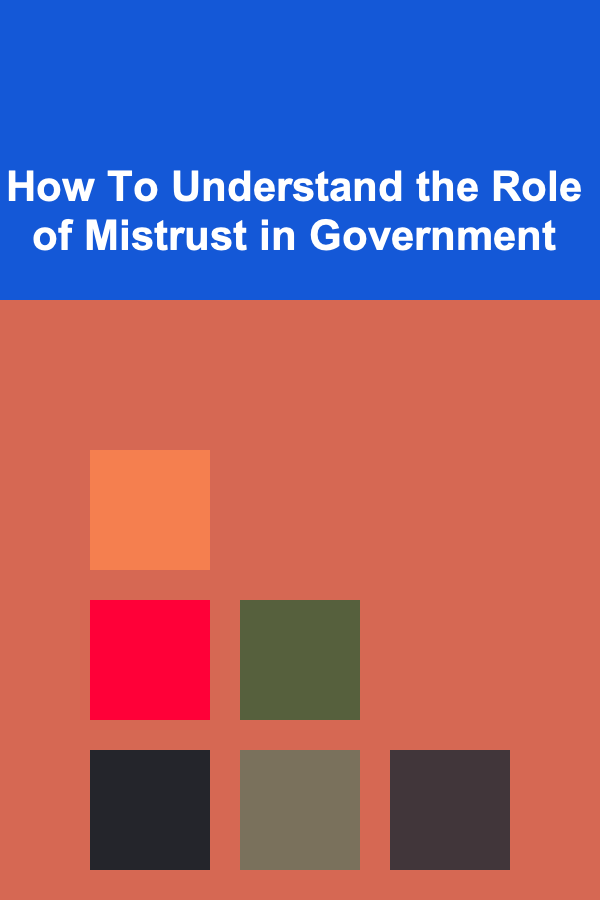
How To Understand the Role of Mistrust in Government
ebook include PDF & Audio bundle (Micro Guide)
$12.99$5.99
Limited Time Offer! Order within the next:

Mistrust in government is a complex phenomenon that has been prevalent in various forms throughout history and continues to be a defining issue in contemporary political landscapes. The relationship between citizens and government institutions has always been characterized by a delicate balance of trust and skepticism. While trust is essential for the effective functioning of governments and societies, mistrust can act as a powerful force for both good and ill. It can lead to accountability, transparency, and reforms, or it can contribute to polarization, division, and social instability. Understanding the role of mistrust in government requires a nuanced approach, recognizing both its potential benefits and dangers.
In this article, we will delve into the causes, effects, and implications of mistrust in government. We will explore the psychological, social, political, and historical factors that contribute to citizens' mistrust, the ways it manifests, and its influence on democratic institutions and governance. By the end, we aim to provide a comprehensive understanding of why mistrust exists, how it can shape public policy, and what steps can be taken to address it in a constructive manner.
The Roots of Mistrust in Government
Mistrust in government is not a new phenomenon. It has existed in various forms throughout human history, often fueled by specific historical events or the actions of governing authorities. However, the causes of mistrust are multifaceted and can vary depending on the cultural, political, and economic context. Some of the most common roots of mistrust in government include:
1. Historical Injustices and Corruption
One of the most significant contributors to mistrust in government is a history of injustice, corruption, and authoritarian rule. When governments fail to protect the rights of citizens, or when they engage in corrupt practices, people's faith in these institutions erodes. Historical examples include instances of colonialism, civil rights abuses, and government cover-ups of scandals, all of which contribute to long-lasting distrust.
The Watergate scandal in the United States, the Iran-Contra affair, and more recent cases like the Panama Papers serve as reminders of how government corruption and dishonesty can significantly damage public trust. These scandals reveal a profound disconnection between the promises made by government officials and the actions they actually take.
2. Perceived Inefficiency and Incompetence
Mistrust also arises when citizens perceive their government as inefficient, incompetent, or unable to meet their needs. Bureaucratic delays, policy failures, and a lack of responsiveness to citizens' concerns can erode confidence in government institutions. For example, when governments fail to address pressing issues like healthcare, education, or social inequality, it fosters a sense that they are not capable of solving the problems that affect ordinary people.
Inefficiency in government is also linked to the perception that the political system is "rigged," favoring certain groups over others, such as the wealthy elite or corporate interests. Citizens may feel that their voices are unheard or ignored, leading to disillusionment and mistrust.
3. Political Polarization and Divisiveness
In an era of increasing political polarization, where parties and ideologies are sharply divided, mistrust in government has been amplified. When political leaders engage in divisive rhetoric, stoke fear, or focus on partisan issues at the expense of the public good, they contribute to the growing divide between citizens and government.
Polarization can also exacerbate distrust between different social, racial, and economic groups. For instance, in societies where racial or ethnic minorities are underrepresented in government, their mistrust can be compounded by feelings of exclusion, discrimination, and inequality. These dynamics further deepen the chasm of mistrust between the people and the government.
4. Lack of Transparency and Accountability
A government that is not transparent or accountable to its citizens invites suspicion and doubt. When political leaders or institutions operate in secrecy, withhold information, or fail to hold themselves accountable for their actions, it fuels skepticism about their intentions and motives. Mistrust often stems from the belief that governments are hiding something, whether it's corruption, mismanagement, or abuses of power.
The digital age, with the proliferation of information and social media, has made transparency more important than ever. Citizens have greater access to information about government actions, and the public's ability to scrutinize policies and decision-making has increased. However, this also means that governments must be more open and accountable to maintain public trust.
5. Economic Inequality and Social Injustice
Economic inequality and social injustice are central issues that often contribute to public mistrust of government. When large segments of the population are marginalized or disadvantaged, they are more likely to perceive the government as serving the interests of the wealthy and powerful at the expense of the poor and vulnerable. This perception of inequality and unfairness can lead to a sense of alienation and mistrust in government institutions that are seen as perpetuating the status quo.
For example, economic policies that favor the wealthy or multinational corporations can exacerbate social divisions and deepen mistrust. Citizens may feel that government institutions are complicit in maintaining an unjust system, fueling resentment and dissatisfaction.
Manifestations of Mistrust in Government
Mistrust in government can manifest in various ways, from apathy and disengagement to active resistance and protest. Some of the most common forms of manifestation include:
1. Low Voter Turnout
One of the most noticeable signs of mistrust in government is low voter turnout. When citizens lose faith in the political system or feel that their vote doesn't matter, they are less likely to participate in elections. Voter apathy can be a direct response to perceived corruption, inefficiency, or a lack of representation. As a result, lower voter turnout undermines the legitimacy of the government and further contributes to feelings of mistrust.
2. Protests and Civil Disobedience
When mistrust reaches a tipping point, it can lead to public protests and acts of civil disobedience. Citizens may take to the streets to demand political change or accountability, or to voice their discontent with government policies. These forms of protest are often a direct response to perceived injustice, inequality, or corruption.
Protests, such as those seen in the Arab Spring, the Black Lives Matter movement, and the anti-austerity demonstrations in Europe, highlight how mistrust in government can translate into social unrest. In these instances, mistrust acts as a catalyst for collective action, as people seek to hold governments accountable for their actions.
3. Rise of Populist Movements
In recent years, mistrust in government has fueled the rise of populist movements across the globe. Populist leaders often capitalize on public discontent by presenting themselves as outsiders who are willing to challenge the "establishment" and restore power to the people. These movements often thrive on the belief that elites and politicians are out of touch with the needs of ordinary citizens.
While populist movements can be seen as a response to legitimate grievances, they can also be dangerous when they exploit societal divisions and undermine democratic norms. Populist leaders may further erode trust in democratic institutions by questioning the legitimacy of elections, promoting conspiracy theories, or rejecting established norms of governance.
4. Conspiracy Theories and Misinformation
Mistrust in government often fuels the spread of conspiracy theories and misinformation. When people do not trust the information coming from official sources, they may turn to alternative narratives that reinforce their skepticism. Conspiracy theories, whether related to government cover-ups, election fraud, or public health issues, can thrive in environments where mistrust is prevalent.
The rise of social media and digital platforms has made the spread of misinformation easier than ever. In many cases, these platforms amplify false narratives and conspiracy theories, further deepening the divide between citizens and government. This can create a vicious cycle of mistrust, as citizens become more distrustful of both government institutions and the media that report on them.
The Impact of Mistrust on Governance and Democracy
Mistrust in government can have profound implications for the functioning of democracy and governance. While it can serve as a check on power and drive political accountability, unchecked mistrust can also undermine the legitimacy of democratic institutions, hinder effective governance, and exacerbate social divisions.
1. Weakening Democratic Institutions
When citizens lose trust in their government, they may become less willing to engage with democratic institutions, which can undermine their effectiveness. A lack of trust in the electoral process, for example, can lead to a diminished sense of legitimacy for elected officials, resulting in decreased political participation and reduced voter turnout. This can weaken the foundations of democracy itself.
Additionally, widespread mistrust can fuel political polarization, as citizens become increasingly divided along ideological lines. This fragmentation of society can make it more difficult for governments to pass legislation, negotiate compromises, or govern effectively. In extreme cases, it can lead to the erosion of democratic norms and the rise of authoritarianism.
2. Erosion of Public Confidence in Public Policy
Mistrust in government can also result in public skepticism toward public policies and initiatives. When citizens do not trust that their government has their best interests at heart, they may be more likely to reject policy proposals or resist government interventions. This can be particularly problematic in times of crisis, such as during a pandemic or economic recession, when effective governance is crucial.
The rejection of public policies based on mistrust can prevent governments from addressing critical issues, from climate change to healthcare reform, and can contribute to a lack of progress on key social and economic challenges.
3. Social Unrest and Instability
In the most extreme cases, widespread mistrust in government can lead to social unrest and instability. When people feel that their voices are not being heard and that the system is rigged against them, they may resort to protests, strikes, and other forms of civil disobedience. If this discontent is not addressed, it can lead to political crises, government overthrows, or even civil war.
4. The Need for Rebuilding Trust
Ultimately, the solution to mistrust in government lies in rebuilding trust between citizens and the institutions that serve them. This requires a commitment to transparency, accountability, and the protection of democratic values. Governments must listen to the concerns of citizens, address inequalities, and work to create policies that benefit all members of society, not just the elite. By doing so, they can begin to restore the trust necessary for effective governance and the health of democracy.
Conclusion
Mistrust in government is a complex and multifaceted issue that affects both the political landscape and the lives of everyday citizens. While mistrust can be a healthy force for accountability and reform, it can also lead to polarization, social unrest, and the erosion of democratic norms. Understanding the causes, manifestations, and implications of mistrust is crucial for addressing the challenges it presents and for rebuilding the trust necessary for effective governance.
To overcome mistrust, governments must prioritize transparency, accountability, and inclusivity. They must actively engage with citizens, listen to their concerns, and take steps to address the structural inequalities and injustices that fuel mistrust. In doing so, they can begin to restore public confidence, strengthen democratic institutions, and ensure that government serves the needs of all people.

Becoming a Successful Account Manager: Proven Techniques for Effective Client Solutions
Read More
How to Clean Your Home When You Have Allergies
Read More
How to Organize Your Online Accounts and Passwords
Read More
How to Understand the Multiverse Theory
Read More
How to Reduce Your Waste Generation Significantly
Read More
How to Backtest Forex Strategies Like a Pro
Read MoreOther Products

Becoming a Successful Account Manager: Proven Techniques for Effective Client Solutions
Read More
How to Clean Your Home When You Have Allergies
Read More
How to Organize Your Online Accounts and Passwords
Read More
How to Understand the Multiverse Theory
Read More
How to Reduce Your Waste Generation Significantly
Read More